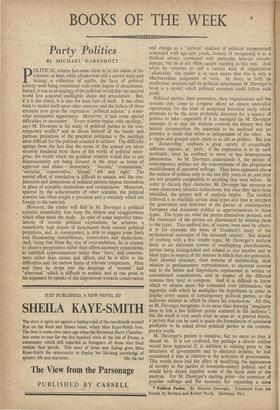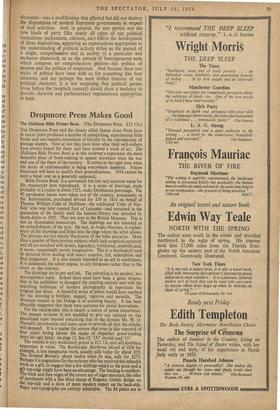BOOKS OF THE WEEK
Party Politics
p
sciences; at least, while physics was still a sacred study and biology a collection of myths, the facts of political activity were being considered with some degree of detachment. Indeed, it was as an analogy, of the political world that the natural world first acquired 'intelligible shape and .articulation. . But, if it is the oldest, it is also the least sure of itself. It has often tried to model itself upon other sciences, and the failure of these attempts now gives the expression ' political science' a some- what antiquated appearance. Moreover, it had some special difficulties to encounter. ' Every science begins with sacrilege,' says M. Duverger in his study, of political parties in the con- temporary world;* and to divest himself of the handy and partisan prejudices of the practical politician is the sacrilege most difficult for the political scientist to achieve. The difficulty springs from the fact that the terms of this science are never securely insulated from those of the world of political enter- prise; the words which the political scientist would like to use dispassionately are being shouted in the street as terms of approval and abuse—' democracy,' fascism," communism,' ` socialist," conservative," liberal," left ' and ' right.' The mental effort of translation is difficult to sustain, and the con- junctions and distinctions of political passion impose themselves in place of scientific distinctions and conjunctions. Moreover, spurred by the achievements of other sciences, the political scientist has often sought a precision and a certainty which are foreign to his material. However, the reader will find in M. Duverger a political scientist remarkably free from the defects and exaggerations which often mark the study. In spite of some imperfect trans- lations of current political expressions, he achieves a remarkably high degree of detachment from current political prejudices, and, in consequence, is able to suggest some fresh and illuminating resemblances, connections and distinctions. And, being free from the vice of over-ambition, he is content to observe propensities.rather than affirm necessary connections, to establish approximations rather than ' laws,' and concomi- tants rather than causes and effects, and he is alive to the difficulties and the narrow limits of relevant comparison. Here and there he drops into the language of ' normal ' and ' abnormal ' which is difficult to sustain, and at one point in his argument he speaks of the dispositions towards conservation and change as a ' natural ' dualism of political temperament connected with age and youth, instead of recognising it as a dualism always connected with particular historic circum- stances; but he is not often caught napping in this way. And when he ventures to call a certain kind of organisation ' admirable,' the reader is at once aware that this is only a Machiavellian judgement of virtu. In short, in both its intellectual restraint and its political detachment M. Duverger's book is a model which political scientists could follow with profit.
Political parties, their generation, their organisations and the systems they come to compose afford an almost unrivalled opportunity for the kind of analytical historical study which promises to be the most profitable direction for a science of politics to take—especially if it is managed (as M. Duverger manages it) so that the analysis controls the history snd the history circumscribes the materials to be analysed and no pretence is made that either is independent of the other. In a vague and general sense, party is as old as politics. But just as dictatorship' confuses a great variety of exceedingly different regimes, so party,' if the expression is to be used profitably, must be confined to more or less homogeneous phenomena. As M. Duverger understands it, the parties of contemporary politics are the concomitants of the progressive establishment of universal suffrage. They have appeared above the surface of politics only in the last fifty years or so, and they are not properly comparable to anything that went before. In order to discern their character, M. Duverger has recourse to some elementary abstract distinctions; but once they have-been identified, the proper task of analysis begins. The method followed is to establish certain ideal types and then to interpret the generation and structure of the parties of contemporary European and American politics as approximations to these types. The types are what the parties themselves portend, and the characters of the parties are illuminated by relating, them to the types. This method has, of course, been used by others; it is for example the basis of Troeltsch's study of the ecclesiastical structures of The sixteenth century. But instead of working with a few simple types, M. Duverger's analysis leads to an elaborate system of overlapping classifications, parties being distinguished and related to one another and to ideal types in respect of the manner in which they are generated, their internal structure, their notions of membership, their relation to parliamentary representation, to electoral systems and to the habits and dispositions represented in written or conventional constitutions, and in respect of the different systems they tend to compose. And it is difficult to know which to admire most—his command over information, the ingenuity with which he multiplies his hypotheses in order to display every aspect of contemporary political parties, or the judicious manner in which he draws his conclusions. All this, as M. Duverger recognises, is no more than drawing imaginary lines to link a few brilliant points scattered in the darkness but the result is very much what he aims at—a general theory, a picture that can be used to guide the formulation of questions profitable to be asked about political parties in the contem- porary world.
M. Duverger's picture is tentative, but no more so than it should be. It is not confused, but perhaps a clearer outline would have appeared if, in addition to relating party to the structures of governments and to electoral systems, he had considered it also in relation to the activities. of governments. This would have had the effect of modifying the appearance of novelty in the parties of twentieth-century politics, and it would have drawn together some of the loose ends of the analysis. For M. Duverger's starting point—the extension of popular suffrage and the necessity for organising a mass
• Polidcal Parties. By Maurice Duverger. Translated from the
electorate—was a modification that affected but did not destroy the dispositions of modern European governments in respect of their activities. And, in general, the new parties and the new kinds of party (like nearly all other of our political institutions; parliaments, cabinets, etc.) follow the development of these dispositions, appearing as organisations appropriate to the understanding of political activity either as the pursuit of a single, comprehensive end (a society of a particular and exclusive character), or as the pursuit of heterogeneous ends which compose no comprehensive pattern—the politics of passion and the politics of scepticism. And because these two styles of politics have been with us for something like four centuries, and are perhaps the most settled features of our political character, it is not surprising that political parties (even before the twentieth century) should show a tendency to provide electoral and parliamentary organisations appropriate to both.



































 Previous page
Previous page